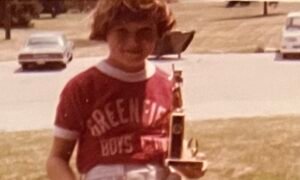Early on, I was wounded by words from someone I once believed to be a friend. I was recovering from back surgery, in a great amount of pain, on even larger amounts of drugs, and I saw the picture pop up on my social media. It was of three of my friends and Chris’s new girlfriend. They’d come from the next state over and were right down the street from me, attending a fundraiser. The caption said, “These girls. <3.”
In my shock and sadness, I texted my friend and said, “I’m sitting in bed recovering from surgery and you are all five miles away, partying as if I don’t exist? Not a call? Not a text? Nothing? I guess I’m a fucking idiot for believing my friends were my friends.”
She replied, “Don’t you dare cuss at me, and don’t take your issues out on me.”
And before I could say anything more, I was blocked. Via text and on every social media channel. Erased. Eliminated.
A few weeks later, I told another friend that I felt I was being replaced so easily. There were so many pictures of Chris and his new girlfriend hanging out with those who used to be my friends, too. It was like an Exact-O knife photo: Cut this one out, add this one in, no one cares about the difference. When I told this friend how I felt, she said I was “making it all up in my head.”
Earlier this week—nearly two years after the other former friend incidents—I wrote this to another friend:
“I wanted you to know that my unfriending you on Facebook wasn’t personal. I had to unfriend everyone who immediately became friends with Chris’s new girlfriend. I wasn’t emotionally ready to see it all play out online. I’ve healed a lot since then. If you’d like to someday be friends again, I would love that. I miss you and your kids. But if you don’t, I understand.”
And after explaining to me how her divorce was far worse than mine and how her pain usurped anything I might feel, she replied, “I’m sorry you blame me for doing something that you perceive as hurtful to you.”
I texted back, “It’s not a blame thing. It’s just an ‘I was hoping my friends might think it through and give me a little more time to heal’ thing.”
And she said, “I’m sorry you feel that way.”
Two years later, still unseen. Still unheard.
~ ~ ~
Last week, I watched 13TH with Sam—my tall, broad, blue-eyed, blonde-haired boy who had marched over 100 hours in the Cincinnati Black Lives Matters protests. He texted me every time he left and every time he returned home. I was worried about him, of course. He planted his body on I-75 to stop traffic. He could have easily been caught up in unintended violence. I worried about white supremacists, rogue cops, stray bullets. I worried he might be a random casualty.
But you know what I never worried about? I never worried about him being a target. His white skin and the blonde curls peeking out from under his ball cap kept him protected. He was not at the end of anyone’s scope. He was no one’s target.
~ ~ ~
For 400+ years, our black community has been beaten, incarcerated, killed. They have lived within a country that silences them because their skin is dark. They have endured systemic racism in every institution that is considered American. But this country was never meant for them. They were always intended to be slaves. And the 13th Amendment confirmed that. When it was no longer fashionable to hang them from trees, they were thrown into jail cells instead.
Controlled. Quieted.
No matter how much they protested, screamed, cried, begged for mercy, we have refused to hear them. Their voices have meant nothing to us. Their words, empty.
~ ~ ~
In the microcosm of my own experience, I think about the pain I have known since I came out and left my heterosexual life and marriage. It has been enough to bring me to my knees, to consider jumping from 9th floor balconies, to cry myself to sleep on so many dark, lonely nights.
And my personal pain?
The pain and erasure that has threatened to destroy me over the past three years?
It’s all-encompassing. It consumes me. It paralyzes me.
And it’s nothing when you consider the collective pain of American black lives.
~ ~ ~
Perspective.
~ ~ ~
I spent most of my life protected by white people who loved me and by white picket fences that separated me from the rest of the dark, ugly underbelly of this country.
I knew so little about systemic racism because it wasn’t about me.
It didn’t affect me.
It didn’t threaten me.
Or my mother.
Or my sister.
Or my children.
So I chose to continue not knowing the things that were vital for me to know.
~ ~ ~
In a recent Psychology Today article about the importance of being heard and understood, this quote was the one that resonated:
“… if we don’t, or can’t, experience others as understanding us—who we are and what we’re about—then all of our other wants can end up feeling relatively meaningless. Not feeling that others really know us can leave us feeling hopelessly estranged from the rest of humanity.”
I wanted my former friends to see me… really see me. To know me. To look beyond their own white picket fences into the world of same-sex attraction… and confusion… and fear… and tumult.
To see both sides of the end of my marriage. To understand that a divorce is never one-sided–not even if one spouse finally understands her true sexual orientation. The other spouse always contributes as well.
To still be considered part of the humanity I’d always experienced.
I wrote about all the things that went wrong during the divorce, including the things that were my fault.
His, too.
But no one wanted to read them.
No one wanted to know.
It was so much easier to use the Exact-O knife and cut me out of the picture. The edges were much cleaner, the resultant photo less messy.
The words were there. The story was there. My friends refused to see it.
They declined the invitation.
~ ~ ~
So, too, have we collectively declined the invitation to hear the stories of our black brothers and sisters, to acknowledge their pain and loss, to make reparations, to move toward peace and understanding.
Stepping outside of a comfort zone is hard. It challenges in ways that make us uncomfortable in our own skin and within our own experience.
But there is no true transformation until the butterfly fights its way out of the cocoon with unsteady, untested wings.
There is no understanding until we agree to dig deeply, to place our fingers in old and unrecognized wounds, to endure the pain of what we’ve chosen so far to ignore.
Internalized racism.
Internalized homophobia.
White privilege.
Heterosexual privilege.
To deny it is to refuse to hear the story.
But within the story is where the truth resides, where the hard work is done, where the next chapter begins. Or perhaps, the next book. The one where the stifled protagonist steps out of the darkness.
The one where the understanding and empathy begins.
But we must be willing to read or listen to the story to begin the understanding. We must accept the pain the words may cause. We must pick up the book and crack the spine to reach the deep, unfamiliar insides.
We must listen.
And then we must listen some more.





2 Responses
I appreciate you sharing you deeply personal and painful experience with people not wanting to leave their comfort bubble is the same type of fingers-in-ears and look-the-other way tendency that many non-blacks exhibit towards various injustices.
George Rogers (correction)